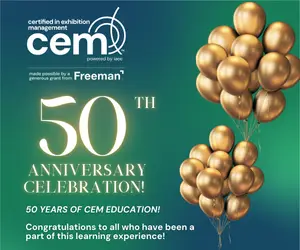By Troy Harrison, The Sales Navigator

Photo credit: DCStudio
Troy Harrison has more than three decades of sales experience and has trained salespeople from 23 different countries on two different continents. He has worked with principals of companies in the United States, Canada, Europe, and the Middle East. He has also shared his knowledge with audiences through programs filled with actionable take-aways that participants can implement the next day to save them time, build their team, or make them money!
Troy has spoken at Expo! Expo! IAEE’s Annual Meeting & Exhibition as well as presented IAEE webinars such as the upcoming I Just Hired a Salesperson…Now What? Onboarding for Sales Success on 13 July. Here, Troy shares with readers his insights into why selling from an intellectual, rather than emotional, viewpoint can yield better results.
I just returned from speaking at a conference of independently owned businesses in Las Vegas. As usual with this group, I had a great time, made some new friends, and made some new business connections. They are truly great people, and honestly, they are a lot of fun in the sessions.
As I was looking through the business cards that I received from attendees, however, something struck me. Most of the businesses had slogans on their cards, as you might expect. And a majority of the slogans were centered on phrases like, “We’re a family business,” “your local source,” etc. That’s normal – but it started me wondering what those company owners wanted to accomplish with those slogans.
Slogans like these are designed to create emotional appeal. By saying that you are a family business, for instance, the idea is to conjure an image of the All-American family that customers support through their patronage, rather than a big, faceless corporation. That’s okay, if your customers are prone to such emotional appeals – but fewer and fewer customers are susceptible to emotional appeals.
The problem is that buying decisions today are made based on intellectual rationale, rather than emotion. That’s not to say that relationships don’t matter – they definitely do – but the basis for those relationships (or at least the start of them) has less to do with personal affinity than with a business decision-making process to select the best vendor for the customer’s needs.
Worse, these slogans send a subliminal message. That message is, “We’re not the best, but you should root for us.” It’s what I call “Underdog selling.” Yes, people definitely root for the underdog – but they don’t buy from them very often.

When I ask these business owners why the customer should care, they always respond with answers like, “Well, we have great service,” or “our customers aren’t just a number.” In other words, they use “me too” statements that have no real benefit to the customer.
I like to give slogans and taglines the “so what” test. That’s what speakers do when they think about a speech. They imagine the audience saying, “So what? Who cares? What’s in it for me? It’s all about me!” Most of these slogans don’t pass the “so what” test. That said, there is a way to make slogans like this meaningful.
What you’re really trying to say when you say things like “we’re family owned” or “we’re local” is that the customer’s buying and ownership experience is different. Okay, great. Now we’re getting somewhere. How is it different?
Do you ask different questions than your competition?
Do you give the customer a more personalized presentation than your competition?
Do you focus more on the customer’s buying process than you do your own sales process? Even better, do those two processes harmonize?
Can you flex and create a more customized solution than your competition?
Does your post-sale experience differ in a positive way from your competition?
And if the answer to any of these is “yes,” how can and do you prove it?
The problem with “we’re small” emotional appeal is simple. Not all customers think that big corporations are something to be avoided. Don’t believe me? Ask your customer if he/she buys from Amazon. I love independently owned companies and support them whenever I can. That said, the best way to get a roll of burgundy colored duct tape to me the next day is to buy it on Amazon (yes, I just did that), so that’s how I spent that money. If you go down the road of thinking that a “we’re small” emotional appeal is an automatic advantage, you’re going to lose a lot of business.
Instead of saying “we’re small,” “we’re family owned,” or “we’re local,” find ways to say “we’re excellent at what we do and here’s why we are the best solution for you.”
In today’s intellectual, information-based world, selling is about discovering customer needs, finding ways to solve those needs, and continuing to solve those needs on an ongoing basis. Failure to do so is to surrender your sale.
About the Author

Troy Harrison is a world-renowned sales speaker, trainer, consultant, and coach. As a speaker, he presents programs that audiences remember and contain immediately applicable lessons and tools that can be used the next day to make more sales. His training programs will help you sell more, build stronger customer relationships, achieve higher profits, and accelerate your company’s growth. As a consultant, he can help you build a stronger sales force, make better hires, reduce sales turnover, and build customer loyalty. His coaching programs will help you build a strong, profitable, high-growth sales force. Find out more at https://www.troyharrison.com/.


